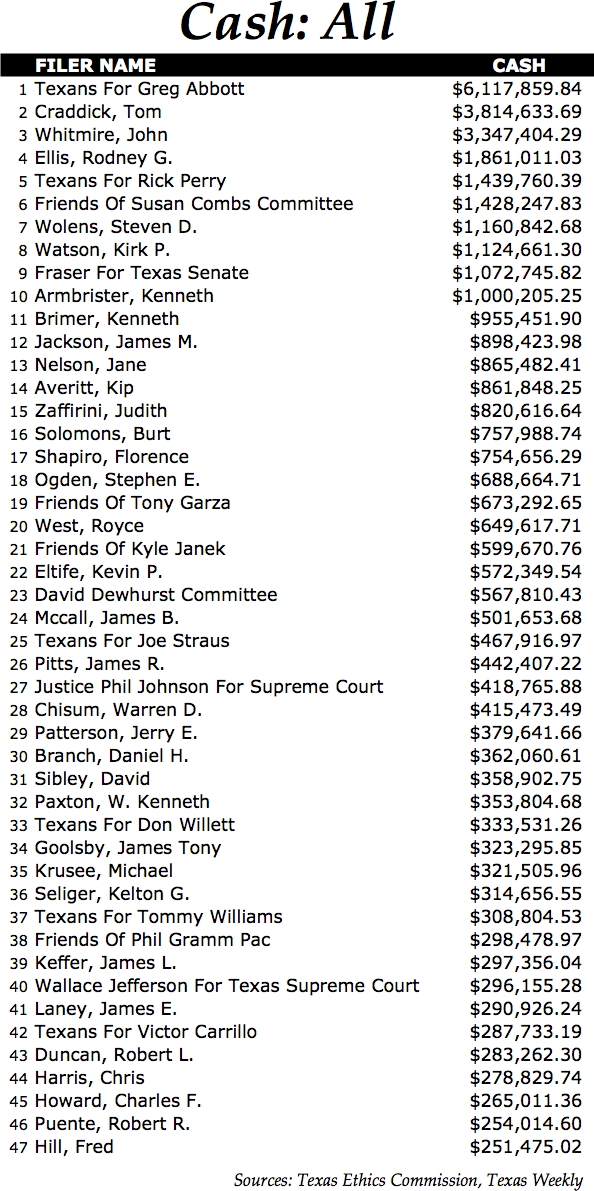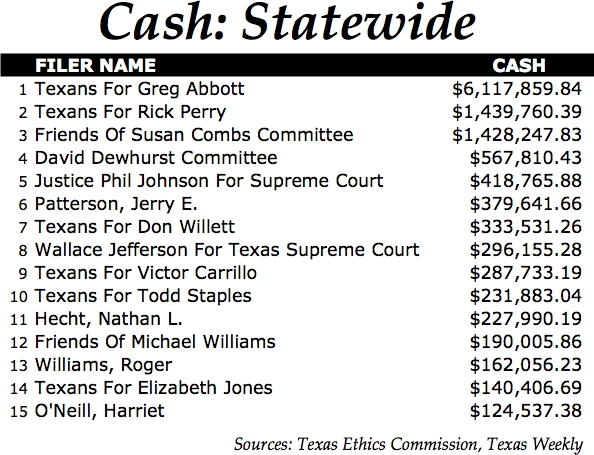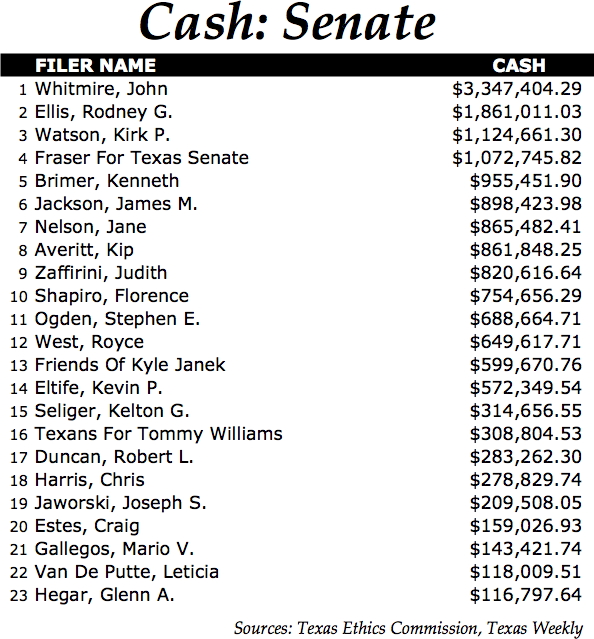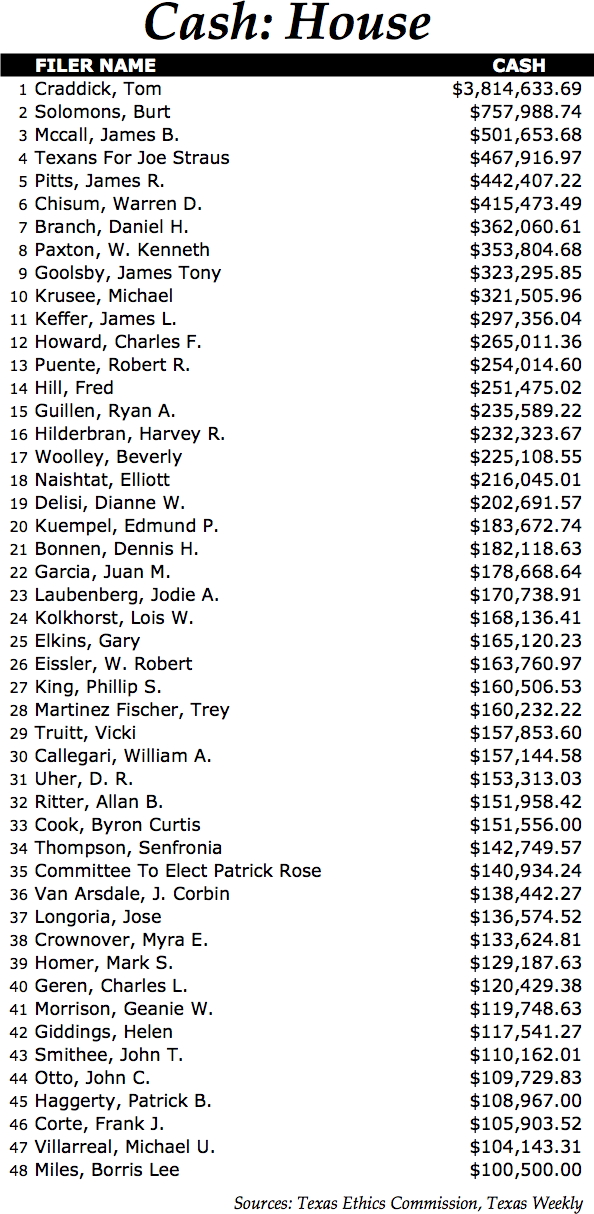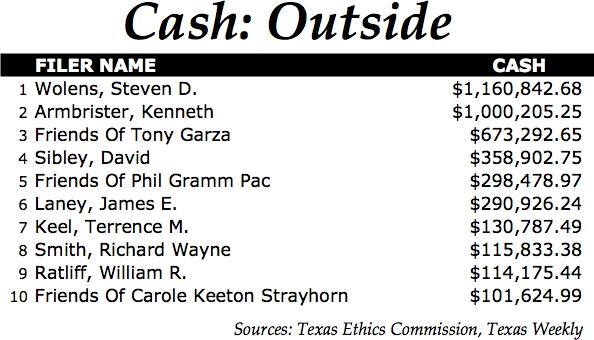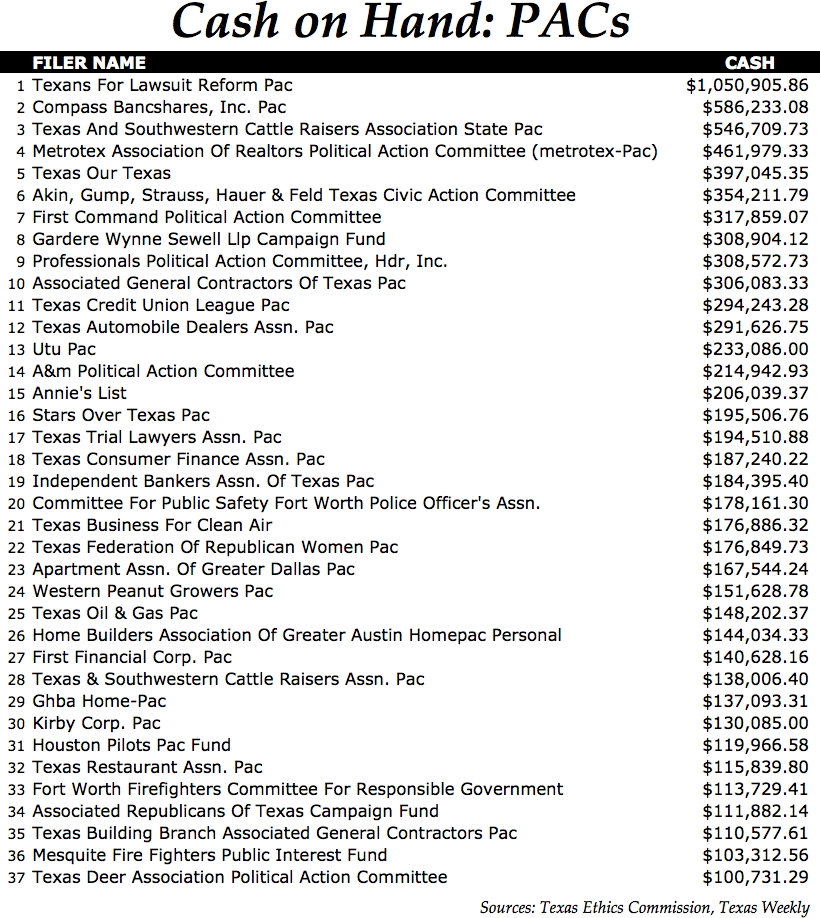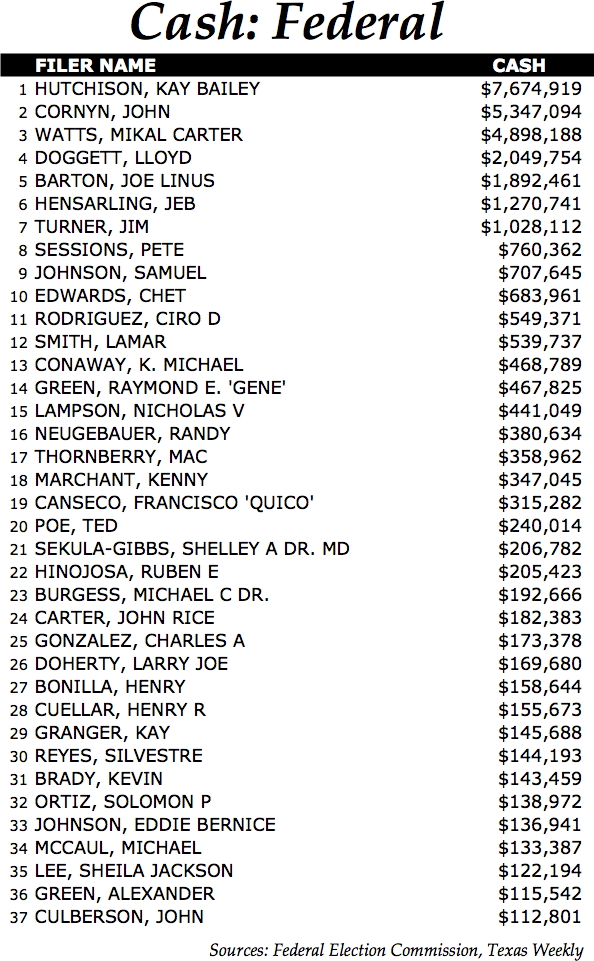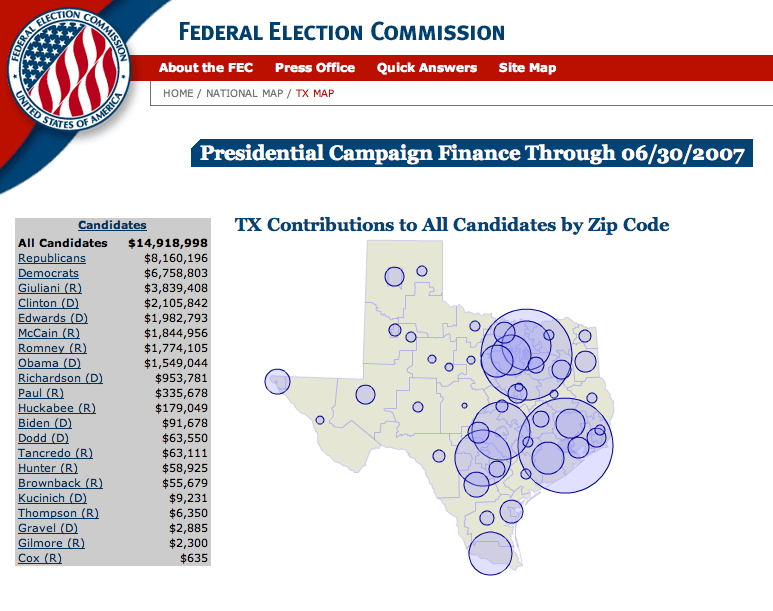Nathan Hecht's battle over Harriet Miers' appointment to the U.S. Supreme Court is lasting longer than hers did.
President George W. Bush tried to put Miers on the court almost two years ago. That fell flat within a month — Samuel Alito got the gig — but Hecht's public support for his old friend has cost him dearly. The latest blast from the canons of judicial ethics is over how the senior justice on the Texas Supreme Court funded his successful effort to clear his name before the State Commission on Judicial Conduct.
The judge racked up a reported $350,000 in legal fees to fight the commission's charge that he improperly used his position on the bench to support the Miers nomination. Now, he faces four complaints filed in the last month questioning how he raised money and paid for his defense.
Texas Watch, the government watchdog group that filed the complaints, says in its latest one that the court's most senior member was out of line when he asked lawyers and businesses with cases before the Court for help with his own personal legal fees.
Here's a twist: Texas Watch bases its newest complaint on the Commission's 1987 public admonishment of then-Supreme Court Justice William Kilgarlin for soliciting funds for a legal defense. Hecht, a Republican, unseated Kilgarlin, a Democrat, a year later, thanks in no small part to the public brouhaha over Kilgarlin's admonishment.
Buck Wood, an Austin lawyer who represented Kilgarlin, says the Kilgarlin and Hecht situations are "indistinguishable." He says the Commission ruled incorrectly in Kilgarlin's case and needs to either admit to that mistake or hoist Hecht with the same petard. "If they stick to what they did in '87, he's got a problem," Wood says.
Texas Watch's three other complaints against Hecht, filed last month with the CJC, the Texas Ethics Commission, and Travis County District Attorney, center around allegations that Hecht ran afoul of state laws by receiving a hefty discount on legal fees from the law firm representing him, a firm that routinely has business before the Court.
Chip Babcock of Jackson Walker successfully fought the CJC's sanctions against Hecht for his public support of Miers. Texas Watch alleges Hecht paid Jackson Walker about $350,000 of the $450,000 bill for that defense — in effect accepting a large and so-far unreported in-kind campaign contribution. Babcock's lawyer in the matter, Roy Minton of Austin, says his client and Hecht have every right to negotiate fees, a common practice in the legal world. "This is America... " Minton says. "That just goes on everywhere."
But Texas Watch says that's either a violation of campaign contribution limits of $30,000 per law firm or an illegal personal gift to the judge. If the complaints are substantiated, Hecht, who was just re-elected last year, could face fines and jail time. His supporters say Hecht is just a victim of political maneuvering, designed to sully a prominent Republican justice's reputation and to fill the coffers of his political opponents. But so far no one on his side is willing to put public bets on what District Attorney Ronnie Earle, the TEC and the CJC, will do.
Alex Winslow, Texas Watch's executive director, says the group complained to uphold the integrity of the state's judicial system: "No one, not even Nathan Hecht, is above the law."
Hecht hasn't risen to that bait, at least publicly, and is staying mum on all the complaints filed against him. But he has hired Austin lawyer Wayne Meissner — running up even more legal bills — to represent him in the DA's investigation.
—by Alan Suderman
To the Courthouse
Mark Williams, the Republican who lost to Rep. Tommy Merritt, R-Longview, last year, is suing his political consultant — Jeff Norwood and Anthem Media — over legal bills that arose from that campaign. Williams' version of the story is that Merritt sued during the campaign and that Norwood told him the costs of the lawsuit "will be covered." Those costs, according to the lawsuit, now total $667,903.41.
Bruce Griggs with the Austin office of Ogletree Deakins called the lawsuit frivolous: "Anthem Media is extremely disappointed that Mark Williams has chosen to file this lawsuit. In the previous defamation case, Mr. Williams testified that he was in charge of his own campaign, that he approved the content of all ads that were placed as part of that campaign, and that all of the ads were truthful then and now. Mr. Williams' prior testimony appears to be inconsistent with the allegations he is now making in the lawsuit, which he filed just a short time after continuing to seek political advice from Mr. Norwood." He didn't comment further.
In his suit, Williams says Norwood promised him the costs of the campaign would be taken care of, and contends the lawsuit that grew out of the campaign was, in fact, a campaign cost. The campaign bills totaling $710,943.96 were apparently paid, but Williams' lawyer hasn't been paid. That's the reason for the suit.
The biggest contributor to Williams's campaign was the Texas Republican Legislative Campaign Committee, which was almost entirely funded by Dr. James Leininger of San Antonio. And if you read between the lines of the lawsuit, his are the deep pockets Williams hopes to tap.
Williams claims in the suit that Norwood promised his legal expenses "would be taken care of" by Leininger and says the only reason there was a defamation claim was because of the campaign ads fashioned by Norwood and approved by Williams and his campaign manager. Williams contends that he, a novice candidate, was duped by the more experienced consultant.
Leininger, according to the suit, never promised to pay for Williams' lawyers; that, Williams contends, is where Norwood led him astray. Williams believed Norwood was the San Antonio millionaire's agent, and figured his legal bills would be covered.
One person familiar with the situation says Williams and his attorneys ran up large legal bills without checking to make sure — in detail — what would be covered and who'd be paying. And one defense will be that they assumed Leininger would pay the whole amount without question. They were in contact with his attorneys at various points, but apparently didn't have a written contract with Norwood, Leininger or anyone else in a position to pay them for their work.
All Roads Lead to Money
The Lite Guv has his list.
David Dewhurst asked state transportation officials for a list of bridges that have the same designation carried by the I-35 bridge that collapsed in Minnesota, and the answer is that 2,024 bridges here are "structurally deficient." But they say you shouldn't wig out.
The term, in the argot of the Texas Department of Transportation and its federal counterparts, means that a bridge is on the charts for improvement or repair within the next ten years. A spokesman for TXDOT says it's "more a funding term than an engineering term." Bridges that are actually unsafe get closed until they're fixed, according to that agency.
In a cover letter, Transportation Commission Chairman Ric Williamson shared the results and made a new pitch for more money for highways. The agency has to choose between maintenance of what it's got and expansion to accommodate the state's growth. At current funding levels, one thing or the other has to wait.
The state says four percent of Texas bridges have the designation, as against 12 percent nationally. And they've cut the number on the list here from 2,928 since 2002. All but 439 of the bridges on the current list are scheduled for repairs or replacement; it would cost more than $500 million to fix those, Williamson said in his letter.
So far, he wrote, lawmakers haven't stepped up. "In the midst of trying to assess the magnitude of the problem, state leadership could not even reach consensus on the tens of billions of dollars we need to spend," Williamson wrote. "... Despite our growing population, increasing traffic and deteriorating road maintenance conditions, the net result of legislative action was to scale back resources."
He included a 92-page list of bridges with the "structurally deficient" classification and a notation for each showing its funding status. That full list is available on the agency's website.
A Little Hitch
The Senate Committee looking for a budget patch for the state's public community colleges got a little jolt. The money isn't where they thought it was.
Gov. Rick Perry vetoed $154 million from the community colleges' budgets, saying they were improperly using the money to pay for benefits for employees who weren't on the state payroll.
He contends that state funds should be used for benefits of employees whose salaries are paid by the state. The community colleges read the law to say state funds can be used for benefits for anyone eligible to be paid with state funds, whether the state actually pays them or not.
The difference, in the second year of the two-year budget, is $154 million. The colleges aren't short-sheeted during the first year of the budget, but the outcry that followed Perry's veto made legislators jump. Sen. Judith Zaffirini, D-Laredo, called a hearing of the Senate Higher Education Subcommittee to see what can be done to replace the money that was vetoed.
That's where the glitch became apparent.
Budgeteers have recently been including language in the budget saying that vetoed money falls into a special account, which can be re-budgeted by the Legislative Budget Board after the full Legislature has gone home.
That language was in the last two budgets but isn't in this one, a tidbit that came as a great surprise to Zaffirini's subcommittee. It means that the LBB can't come in and take the $154 million in vetoed funds and use it to patch the problem. They'll have to use other tricks. Sen. Kyle Janek, R-Houston, asked whether the LBB has the power to delay planned payments in the budget, then use the money freed by the delays for community colleges.
The answer? Yup, and the next Legislature would be able to come back in time to make the delayed payment and balance the budget.
The LBB can't put the money right back where Perry vetoed it. Lawmakers are looking for a way to work around the "proportionality" payments, getting the money to the colleges without allowing them to use it for the employee benefits Perry whacked. And because the cuts are in the second year of the two-year state spending plan, they've got almost a year to find a solution before there's any real effect on the colleges' finances.
And the meeting made it apparent that the governor's office — like the Legislature — wants to work this out before the colleges are forced to raise tuition or property taxes. That's a move they'd blame on the folks in Austin.
Sale!
It's amazing what a difference 8-1/4 percent makes to consumers, but the annual sales tax holiday is upon us and retailers are predicting the now-traditional annual pre-school maelstrom at malls and stores across the state. Consumers don't have to pay taxes on clothing, shoes and backpacks that cost less than $100, and school starts in a couple of weeks. You know the drill.
There's some grumbling on the policy front, however. The Center for Public Policy Priorities says the best breaks go to families with the money to buy a lot of stuff instead of a little. And they site an Indiana University study that shows 40 percent of the benefit of the tax break goes to people who make more than $70,000 annually.
Texas isn't alone in doing this, and in fact, is more moderate about it than some states. In Tennessee, you get a break on up to $1,500 worth of computer equipment. Florida and Georgia do it for energy-efficient appliances. Michigan and Ohio cut taxes on certain cars and trucks. And some states just shut off the tax. In Massachusetts, consumers can buy up to $2,500 tax-free for two days. Sen. Rodney Ellis, D-Houston, one of the original authors of the tax cut, says he plans to seek an expansion to include some of those things in Texas, and to stretch the freebies over two weeks instead of one weekend.
Headache Relief for the Speaker
State Rep. Robert Talton, a key player in the ongoing challenges to House Speaker Tom Craddick, will run for Congress next year instead of seeking reelection to the Texas Legislature.
Talton, a Pasadena Republican, is after the seat now held by U.S. Rep. Nick Lampson, D-Stafford. He's the second Republican to jump in; Shelley Sekula Gibbs, who lost to Lampson last year, wants another shot. And Talton says there are four other Republicans who are still deciding. He filed papers this week and will make a formal announcement in a couple of weeks. "I'm trying to make two news stories out of this," he jokes.
Talton was the first Republican last year to say he would challenge Craddick for speaker. He folded his bid and joined the unsuccessful effort to replace Craddick with Rep. Jim Pitts, R-Waxahachie, and then joined with members who kept heavy pressure on the speaker for the rest of the session. He's not retreating, but says he always wanted to run for Congress and now's the time. "I've always regarded the Texas Legislature as a training ground, and I think I'm ready [for Congress]," he says.
The CD-22 seat was held by former U.S. House Majority Leader Tom DeLay, R-Sugar Land. Sekula Gibbs served the stub term between DeLay's resignation and the general election. She was a write-in candidate in that contest and lost to Lampson.
Ken Legler of Pasadena announced he'll be in the race for Talton's seat and said the incumbent will be his model (Talton hasn't endorsed anybody). Legler is owner and president of Houston Wire Works and a board member at the Texas Association of Business and at the National Federation of Independent Business.
A Tale of Two Kitties
State Rep. Rick Noriega, D-Houston, filed a financial disclosure for the U.S. Senate race that shows him to be, he says, "a regular Texan, of middle-class means."
He made $128,000 from his economic development job with Centerpoint Energy, $37,000 from the Texas National Guard, and $10,800 from his job as a state representative during the 18 months that ended in June.
Mikal Watts, the other Democrat seeking to knock off U.S. Sen. John Cornyn, filed one, too. He made more money than Noriega, Cornyn, and probably you, too. He earned about $40 million during that year-and-a-half.
Meanwhile, fourteen mayors from Hidalgo County jointly endorsed Watts, citing his South Texas roots and blasting Cornyn without mentioning Noriega.
And Noriega posted a new web ad on YouTube that says Americans "took our eye off the ball in Afghanistan by moving this war to Iraq, and it's time to stop this war." He touts his service and swipes at Cornyn, without mentioning Watts.
First-term Blues
Freshman Rep. Thomas Latham, R-Mesquite, will have an opponent in HD-101, and freshman Rep. Mike O'Day, R-Pearland, might not seek reelection.
Mesquite Mayor Mike Anderson is quitting after ten years to run for the Texas House. He'll challenge Latham in the GOP primary next year. We reported Anderson's interest in the CD-101 race in June, and Latham, a former cop, could be vulnerable. He's only been in office since last year and the Mesquite Police Association already withdrew its support. Latham got to Austin by knocking off Rep. Elvira Reyna in the 2008 Republican primary. He was one of several candidates backed by the Texas Parent PAC. This is Anderson's second run; he lost a squeaker to Democrat Dale Tillery in 1994, finishing 173 votes behind. Anderson has been mayor for ten years and on Mesquite's City Council for 21 years. He'll officially resign on Monday, and is still pulling a campaign staff together.
Meanwhile, O'Day, who won a special election and replaced the late Rep. Glenda Dawson, R-Pearland, is telling colleagues he won't seek reelection next year. That would open the door for an open race in CD-29. O'Day didn't return calls and hasn't made a formal announcement. The guy he beat in a special election last January isn't waiting: Randy Weber says he'll run in the Republican primary whether or not O'Day seeks reelection.
Political Morsels
Houston lawyer Barbara Ann Radnofsky, who lost last year's race for U.S. Senate to Kay Bailey Hutchison, has kept her email list alive and is promoting a list of other candidates for state and local offices. The subject line: "These Candidates Are Not Insane." Radnofsky mentions in that missive that she's "looking at a 2010 race for state Attorney General."
• Republicans aren't the only folks interested in HD-97, where Rep. Anna Mowery, R-Fort Worth, is retiring. Dan Barrett, an attorney who ran against Mowery last year, says he'll run. He got just under 41 percent last November against the incumbent.
While we're here, move Craig Goldman from test driver to buyer; he'll run. He worked for the National Republican Senatorial Committee in 1994 when former U.S. Sen. Phil Gramm was in charge, and says he's a small bidnessman with deep roots in Fort Worth. This is his first race.
• After the Labor Day holiday, Texas Libertarians still start a ten-week, 25-city swing through the state to round up a slate of candidates for the 2008 elections. Wes Benedict, the party's executive director, makes a campaign sound like something you'd get in a kit from a hobby shop: "If you're a dissatisfied voter, it's time to stop complaining about politicians and run for office yourself! It's fun, it's free, and it's easier than you think! Come find out about it." Unlike the Democrats and Republicans, Libertarian candidates don't pay filing fees. One more thing: They want their folks to take "The World's Smallest Political Quiz," which you can find on the Internet at www.theadvocates.org.
• Lordy, lordy! Texans for Public Justice tallied the expenditures by TXU and the companies trying to buy it during the legislative session and came up with $14.5 million to $16.9 million, depending on the final lobby costs. That includes $10.9 million in advertising, $180,445 for food, drinks, entertainment and gifts, and $3.5 to $5.8 million for lobbyists. That last one has a wide range because of the lame reporting requirements the Legislature imposes on lobbyists. TXU spent at least the lower amount and not more than the higher amount, a difference of $2.3 million.
Flood Resigns
Brian Flood, the inspector general for the state's Health and Human Services Commission, is leaving after four years in that post. He was the author of a critical report on the agency's system for qualifying and tracking welfare recipients earlier this year. The agency took issue with parts of his report and is waiting for federal approval before expanding what they call the Texas Integrated Eligibility Redesign System, or TIERS.
Flood's report, issued while the Legislature was in session, was alarming and bolstered arguments against privatization of state services: "... based on an extrapolation of the findings of their audit, if TIERS were deployed statewide today, it could increase the state's questioned costs, as found in the recent audit, covering 1 million to 1.85 million more needy Texans, and ranging between $2.6 and $4.9 billion more taxpayer dollars." The system is operating in three of the state's 254 counties and HHSC officials hope to expand that, with federal approval, soon.
Flood will be replaced, for now, by his deputy, Bart Bevers of Round Rock. Gov. Rick Perry named him the interim inspector general. It's a one-year term; Perry had reappointed Flood in earlier years, but didn't act when Flood's one-year term expired in February. Flood didn't refer to that in his resignation letter, saying instead that he thinks it's time to do other things. And the governor's comments were complimentary: "The Office of the Inspector General has become a model for states across the nation," he said.
That operation is bigger than most state agencies, with around 500 employees doing inspections and audits and such. Flood was the first inspector general at HHSC when that agency was created.
Political People and Their Moves
Stuart Jenkins is the latest guy with a new title as a result of the shuffle started at the Texas Youth Commission this year. He'll head the Parole Division at the Texas Department of Criminal Justice, replacing Brian Collier. Collier replaced Ed Owens as deputy executive director of that agency when Owens left to become conservator at TYC.
Gov. Rick Perry appointed Victor Hugo Gonzalez of McAllen to preside over the Texas Diabetes Council. Gonzalez is an eye surgeon and medical director at Valley Retina Institute.
The governor named W. Benjamin Fry of San Benito as presiding officer of the Texas State Board of Pharmacy. He's the past owner of two pharmacies: Fry's, in San Benito, and Small Fry's, in Harlingen.
Perry named Corpus Christi homebuilder Gerardo Garcia to the Texas Residential Construction Commission that regulates that industry. He reappointed two current members: Glenda Marriott of College Station, president of GCM Designs, and Mickey Redwine, owner and CEO of Dynamic Cable Holdings in Ben Wheeler.
State Rep. Dan Flynn, R-Van, was elected to the executive council of the National Conference of State Legislators.
Engaged: Jenna Bush, daughter of George and Laura, and Henry Hager, a former campaign op whose father John Hager, is a former lieutenant governor of Virginia and Bush appointee in the Department of Education who now heads the Virginia GOP. No wedding date has been set.
Quotes of the Week
Karl Rove, talking to reporters on Air Force One about what he'll do next, quoted by The New York Times: "I'd like to teach eventually, but in the meantime I need to make some money. I have an employment record that I think would be attractive to any employer: I've worked in an industrial kitchen in a hospital; I've waited tables; I've worked in convenience stores and have been robbed at the point of a gun twice; I've pumped gas; I've babysat; I've cut lawns; I've delivered newspapers."
Rep. Pat Haggerty, R-El Paso, quoted in the El Paso Times the Speaker refusing to allow a challenge to his leadership position earlier this year: "God died and left Tom Craddick with absolute power."
Houston businessman Massey Villarreal, quoted in the Houston Chronicle: "I've been trying to put my finger in the dam of Hispanics leaving the Republican Party and I can't anymore. I've run out of fingers."
U.S. Sen. John Cornyn, R-Texas, talking to the Austin American-Statesman about Alberto Gonzales, who's appointment Cornyn supported: "He's a good person, but I look at his jobs he's held, and I wonder what has prepared him for being the head of the Department of Justice and 110,000 employees in a highly partisan and difficult political environment."
Texas Weekly: Volume 24, Issue 9, 20 August 2007. Ross Ramsey, Editor. Copyright 2007 by Printing Production Systems, Inc. All Rights Reserved. Reproduction in whole or in part without written permission from the publisher is prohibited. One-year online subscription: $250. For information about your subscription, call (512) 302-5703 or email biz@texasweekly.com. For news, email ramsey@texasweekly.com, or call (512) 288-6598.


